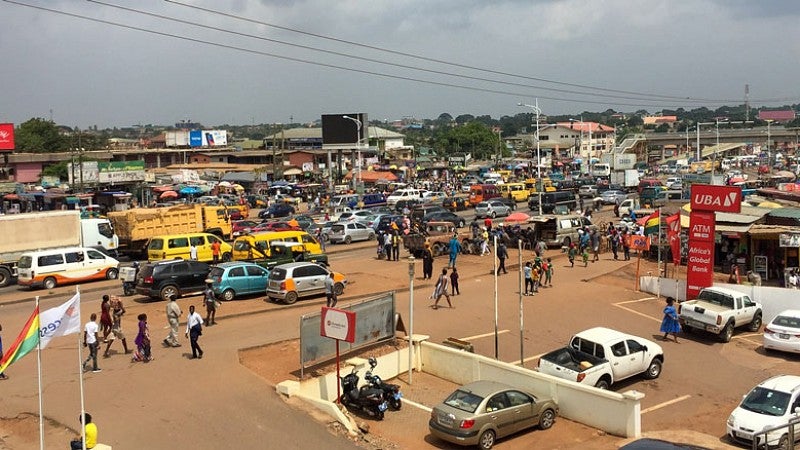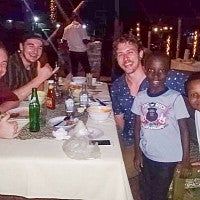
Editor’s note: Each summer, SOJC students travel to Ghana to immerse themselves in hands-on fieldwork. This is the second post in a series chronicling the Media in Ghana program through the eyes of student intern C. Francis O’Leary. Read their first post about how to prepare for a trip to Ghana.
I traveled in Russia in 2015. While I was there, a waiter assured me, “Russians don’t hate Americans. That’s the politicians talking.” His message was essentially that the average person is more concerned with making rent, spending time with family and friends, eating good food and listening to good music.
Bearing this in mind, I purposely tried to avoid making assumptions about what my experience in Ghana would be like. I assumed this would help me avoid culture shock, but within the first few days I still found myself wondering about some of the occurrences I saw and took part in.
The most jarring was the traffic. I found it to be chaotic at best and frightening at worst. The driver of a bus I was on narrowly avoided hitting someone who ran across a crosswalk before it was their turn. After braking suddenly, the driver said, “You just have to learn to see the rhythm in the chaos.”
Now to me, rhythm and chaos seem diametrically opposed. But I took the advice to heart and learned to trust the drivers and other pedestrians. Now I feel comfortable doing as the locals do: hopping out of public transport at stoplights rather than official stops, weaving between cars to cross the street, and relaxing rather than sitting on the edge of my seat when we’re driving through town.

There have been a few experiences in Ghana I wasn’t nearly as fond of, such as the inefficiency of communication. In my work in the U.S., setting up interviews has been simple: Contact the person I want to interview, either directly or through a publicist. Set an appointment and method for the interview. Conduct the interview at the established time and place. Follow up. Here, a supervisor told me, “Go to PRESEC (a local high school) and ask for Auntie Matilda. She’ll set you up with the headmaster.” When I got to the school, Auntie Matilda was nowhere to be found. I ended up speaking to the headmaster’s secretary, and she turned me away for not having a letter from the news station requesting an interview. When I returned to the station, I was scolded for not finding Auntie Matilda.
I don’t understand how that system is easier or more efficient than printing a letter. I never got the interview.
More shocking than ineffective communication is the prevalence of what I see as sexual harassment. I love taking photos around the station and often pop into various studios to shoot during recordings. After one show, a male staff member saw me with my camera, grabbed a female staff member by the wrist and pulled her in for a photo. She twisted her arm and tried to get behind me. I snapped at my coworker, “Let her go!” He responded that he just wanted a picture with her, but I insisted she was a grownup and could decide for herself whom she wanted a photo with.
The most surprising part of the exchange was that I was the only person in the room who reacted at all. The rest of the Ghanaian men seemed comfortable with what he had done. Of everything I’ve seen in Ghana, this is one type of behavior I won’t accept as being part of the culture—particularly because it was part of American culture not long ago.
Research shows that when experiencing a new place for the first time, culture shock initially makes everything new and exciting. Then the differences from one’s norm become irritating before one develops strategies to cope with difficulties and eventually reach acceptance. I believe I’ve passed the phase where everything is novel and am somewhere between the stages of irritation and coping.
Still, I occasionally step out of the building and feel a blast of heat. As my eyes adjust to the light, I see the chaos of traffic and hear the hawkers vying for attention, and I can’t help but smile as I dive into the crowd.

